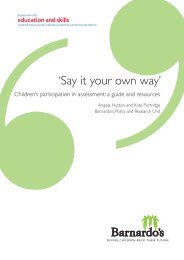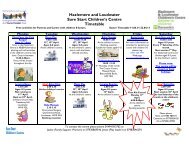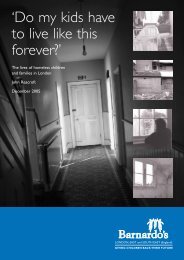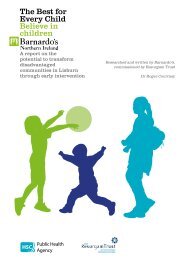Splintered Lives - Barnardo's
Splintered Lives - Barnardo's
Splintered Lives - Barnardo's
Create successful ePaper yourself
Turn your PDF publications into a flip-book with our unique Google optimized e-Paper software.
PAGE 10<br />
chapter<br />
4<br />
Sexual exploitation<br />
as sexual abuse 7 of children<br />
The 1980s witnessed a renewed awareness of the sexual abuse of children; it had<br />
previously been a central focus of first wave feminism and child welfare organizations<br />
in the late nineteenth century (Gordon, 1988; Jeffreys, 1984). Growing recognition of its<br />
incidence and prevalence has occurred, although debates continue to explore the<br />
definition of sexual abuse. One of the issues most frequently raised in research is<br />
whether 'non-contact' forms (such as flashing, sexualised talk) should be included 8 .<br />
Other unresolved issues are whether, when and what forms of intervention are<br />
appropriate, and on what grounds particular cases or forms of abuse are deemed<br />
'credible' and/or proven. Whilst social acceptance of the fact that sexual abuse is far<br />
more common than previously envisaged is relatively widespread, adults as individuals and<br />
as representatives of powerful institutions have not just retained, but reinforced<br />
their power to decide in which contexts they will and will not believe, will and will not<br />
act.<br />
This new general awareness has been the outcome of three interlinked factors (see<br />
Finkelhor, 1979 and Kelly, 1988 for more detailed discussions): two were present during<br />
the previous period of public concern - a strong feminist movement, and child welfare<br />
organisations; the third is a late twentieth century phenomenon - the increased amount<br />
and availability of knowledge through research and media attention. The 'knowledge<br />
explosion' we have witnessed over the last two decades reveals crucially important<br />
insights (see, for example, Droisen and Driver, 1989; Finkelhor, 1979, 1986; Kelly 1988;<br />
Liddle 1993):<br />
�� that males are the vast majority of sexual abusers of children;<br />
�� that children are most likely to be abused by a male that they know;<br />
�� that abuse takes a range of forms, occurs in varying contexts, and within a<br />
diversity of relationships;<br />
�� that individuals and agencies have frequently failed to respond appropriately<br />
to cases of sexual abuse, often blaming the victim and excusing the offender;<br />
�� that these findings are echoed in the knowledge developed over the last 20<br />
years about male abuse of adult women.<br />
The many ways in which children are abused and exploited raise uncomfortable issues<br />
about adult power and responsibility, the structure of the western nuclear family,<br />
fatherhood, motherhood, masculinity and male sexuality. They, furthermore, challenge<br />
the western fiction that childhood is "a time of play, an asexual and peaceful existence"<br />
(Kitzinger 1988, p.78). The power of this ideology is evident in the repeated use of<br />
emotive pictures of children by charities - western child protection agencies using<br />
………………………………………………………………………………………………………..<br />
7<br />
Debate at the Brussels seminar included some discomfort with the term 'sexual abuse', since it implicitly suggests some form<br />
of acceptable 'sexual use', The conceptual difficulty was not confined to English usage, although in some languages the terms<br />
used did not carry similar implications, One suggestion was to use 'sexual violence against children' - a translation from<br />
current French usage, Whilst we recognise the problems inherent in the term 'sexual abuse' we have made the pragmatic<br />
decision to use it in this document, since it is currently the most widely used term,<br />
8<br />
This formed a major part of the media debate in June 1995 on findings from a survey commissioned by National Society for<br />
the Prevention of Cruelty to Chiidren (NSPCC),
















